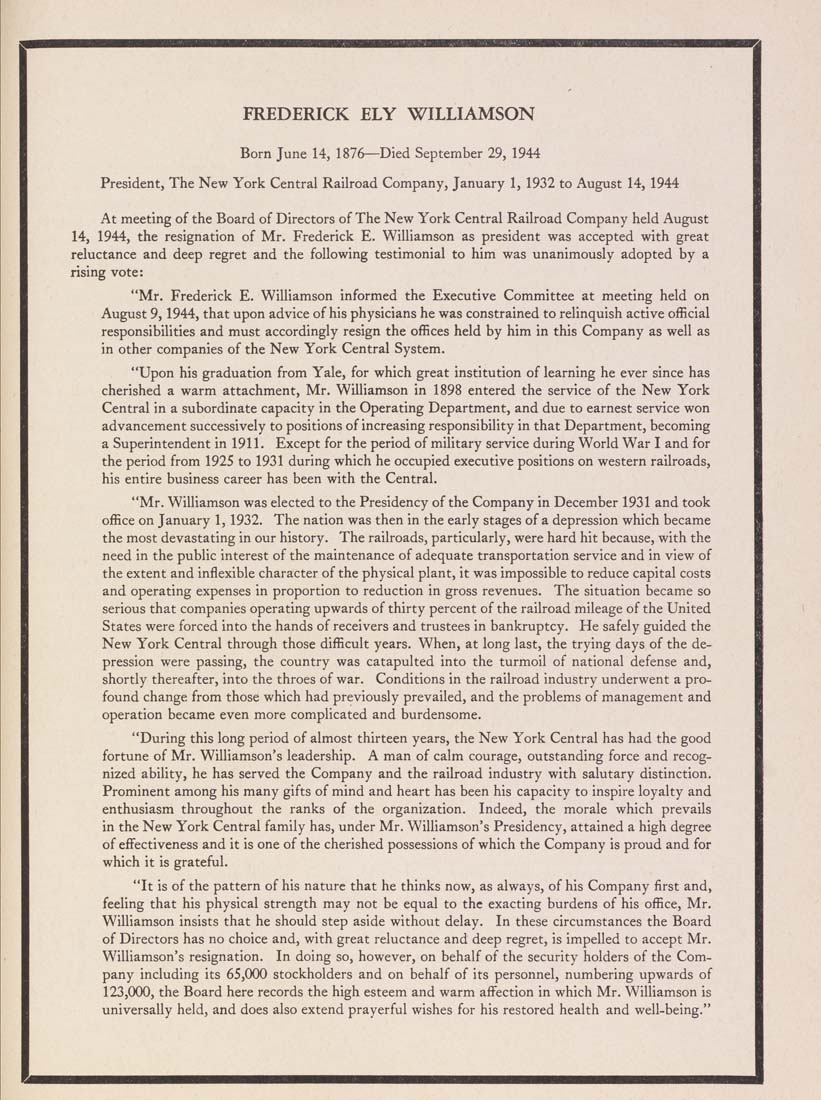FREDERICK ELY WILLIAMSON
Born June 14, 1876—Died September 29, 1944
President, The New York Central Railroad Company, January 1, 1932 to August 14, 1944
At meeting of the Board of Directors of The New York Central Railroad Company held August
14, 1944, the resignation of Mr. Frederick E. Williamson as president was accepted with great
reluctance and deep regret and the following testimonial to him was unanimously adopted by a
rising vote:
"Mr. Frederick E. Williamson informed the Executive Committee at meeting held on
August 9,1944, that upon advice of his physicians he was constrained to relinquish active official
responsibilities and must accordingly resign the offices held by him in this Company as well as
in other companies of the New York Central System.
"Upon his graduation from Yale, for which great institution of learning he ever since has
cherished a warm attachment, Mr. Williamson in 1898 entered the service of the New York
Central in a subordinate capacity in the Operating Department, and due to earnest service won
advancement successively to positions of increasing responsibility in that Department, becoming
a Superintendent in 1911. Except for the period of military service during World War I and for
the period from 1925 to 1931 during which he occupied executive positions on western railroads,
his entire business career has been with the Central.
"Mr. Williamson was elected to the Presidency of the Company in December 1931 and took
office on January 1, 1932. The nation was then in the early stages of a depression which became
the most devastating in our history. The railroads, particularly, were hard hit because, with the
need in the public interest of the maintenance of adequate transportation service and in view of
the extent and inflexible character of the physical plant, it was impossible to reduce capital costs
and operating expenses in proportion to reduction in gross revenues. The situation became so
serious that companies operating upwards of thirty percent of the railroad mileage of the United
States were forced into the hands of receivers and trustees in bankruptcy. He safely guided the
New York Central through those difficult years. When, at long last, the trying days of the de¬
pression were passing, the country was catapulted into the turmoil of national defense and,
shortly thereafter, into the throes of war. Conditions in the railroad industry underwent a pro¬
found change from those which had previously prevailed, and the problems of management and
operation became even more complicated and burdensome.
"During this long period of almost thirteen years, the New York Central has had the good
fortune of Mr. Williamson's leadership. A man of calm courage, outstanding force and recog¬
nized ability, he has served the Company and the railroad industry with salutary distinction.
Prominent among his many gifts of mind and heart has been his capacity to inspire loyalty and
enthusiasm throughout the ranks of the organization. Indeed, the morale which prevails
in the New York Central family has, under Mr. Williamson's Presidency, attained a high degree
of effectiveness and it is one of the cherished possessions of which the Company is proud and for
which it is grateful.
"It is of the pattern of his nature that he thinks now, as always, of his Company first and,
feeling that his physical strength may not be equal to the exacting burdens of his office, Mr.
Williamson insists that he should step aside without delay. In these circumstances the Board
of Directors has no choice and, with great reluctance and deep regret, is impelled to accept Mr.
Williamson's resignation. In doing so, however, on behalf of the security holders of the Com¬
pany including its 65,000 stockholders and on behalf of its personnel, numbering upwards of
123,000, the Board here records the high esteem and warm affection in which Mr. Williamson is
universally held, and does also extend prayerful wishes for his restored health and well-being."
|








